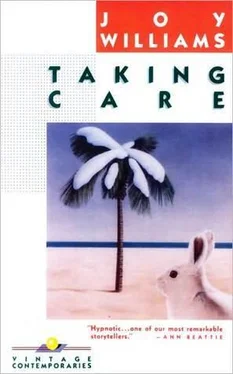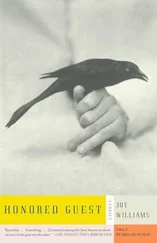Joy Williams - Taking Care
Здесь есть возможность читать онлайн «Joy Williams - Taking Care» весь текст электронной книги совершенно бесплатно (целиком полную версию без сокращений). В некоторых случаях можно слушать аудио, скачать через торрент в формате fb2 и присутствует краткое содержание. Год выпуска: 2010, Издательство: Vintage, Жанр: Современная проза, на английском языке. Описание произведения, (предисловие) а так же отзывы посетителей доступны на портале библиотеки ЛибКат.
- Название:Taking Care
- Автор:
- Издательство:Vintage
- Жанр:
- Год:2010
- ISBN:нет данных
- Рейтинг книги:5 / 5. Голосов: 1
-
Избранное:Добавить в избранное
- Отзывы:
-
Ваша оценка:
- 100
- 1
- 2
- 3
- 4
- 5
Taking Care: краткое содержание, описание и аннотация
Предлагаем к чтению аннотацию, описание, краткое содержание или предисловие (зависит от того, что написал сам автор книги «Taking Care»). Если вы не нашли необходимую информацию о книге — напишите в комментариях, мы постараемся отыскать её.
Taking Care — читать онлайн бесплатно полную книгу (весь текст) целиком
Ниже представлен текст книги, разбитый по страницам. Система сохранения места последней прочитанной страницы, позволяет с удобством читать онлайн бесплатно книгу «Taking Care», без необходимости каждый раз заново искать на чём Вы остановились. Поставьте закладку, и сможете в любой момент перейти на страницу, на которой закончили чтение.
Интервал:
Закладка:
Her obstetrician had told her at the time that he had never seen a more perfectly shaped head.
The Wilsons’ surroundings are splendid. Mrs. Wilson has splendid clothes, a splendid figure. She has a wonderful Cuban cook. The house is worth three quarters of a million dollars. The plantings are worth a hundred thousand dollars. Everything has a price. It is fantastic. A precise worth has been ascribed to everything. Every worm and aphid can be counted upon. It costs a certain amount of money to eradicate them. The sod is laid down fresh every year. For weeks after the lawn is installed, the seams are visible and then the squares of grass gather together and it becomes, everywhere, in sun or shade, a smooth, witty and improbable green like the color of a parrot.
Mrs. Wilson follows the yard boy around as he tends to the hibiscus, the bougainvillea, the poinciana, the horse cassia, the Java flower, the flame vine. They stand beneath the mango, looking up.
“Isn’t it pagan,” Mrs. Wilson says.
Close the mouth, shut the doors, untie the tangles, soften the light, the yard boy thinks.
Mrs. Wilson says, “It’s a waste this place, don’t you think? I’ve never understood nature, all this effort. All this will She flaps her slender arms at the reeking of odors, the rioting colors. Still, she looks up at the mangoes, hanging. Uuuuuh, she thinks.
Tao is standing between the yard boy and Mrs. Wilson with an oleander flower in his mouth. It is pink. Tao’s hair is golden. His eyes are blue.
The yard boy removes the flower from the little boy’s mouth. “Toxic,” the yard boy says.
“What is it!” Mrs. Wilson cries.
“Oleander,” the yard boy says.
“Cut it down, dig it out, get rid of it,” Mrs. Wilson cries. “My precious child!” She imagines Tao being kidnapped, held for an astronomical ransom by men with acne.
Mrs. Wilson goes into the house and makes herself a drink. The yard boy walks over to the oleander. The oleander shakes a little in the breeze. The yard boy stands in front of it for a few minutes, his clippers by his side.
Mrs. Wilson watches him from the house. She swallows her drink and rubs the glass over her hot nipples. The ice clinks. The yard boy raises the clippers and spreads them wide. The bolt connecting the two shears breaks. The yard boy walks over to the house, over to where Mrs. Wilson stands behind glass doors. The house weighs a ton with the glass. The house’s architect was the South’s most important architect, Mrs. Wilson once told the yard boy. Everything he made was designed to give a sense of freedom and space. Everything was designed to give the occupants the impression of being outside. His object was to break down definitions, the consciousness of boundaries. Mrs. Wilson told the yard boy the architect was an asshole.
Behind the glass, Mrs. Wilson understands the difficulty. Behind Mrs. Wilson’s teeth is a tongue that tastes of bourbon.
“I’ll drive you downtown and we can get a new whatever,” she says. She is determined.
She and he and Tao get into Mrs. Wilson’s Mercedes 350 SL. Mrs. Wilson is a splendid driver. She has taken the Mercedes up to 130, she tells the yard boy. It is 130 that the engine is capable of, nothing more. The engine stroked beautifully at 130, no sound of strain at all.
She drives past the beaches, over the causeways. She darts in and out of traffic with a fine sense of timing. Behind them, occasionally, old men in Gremlins jump the curb in fright. Mrs. Wilson glances at them in the rear-view mirror seeming neither satisfied nor dissatisfied. She puts her hand on the yard boy’s knee. She rubs his leg.
Tao scrambles from the back into the front seat. He gets on the other side of the yard boy. He bites him.
I am living in a spiritual junkyard, thinks the yard boy. I must make it into a simple room with one beautiful object.
Sweat runs down the yard boy’s spine. Tao is gobbling at his arm as though it is junket.
“What is going on!” yells Mrs. Wilson. She turns the Mercedes around in the middle of the highway. A Good Humor truck scatters a tinkle of music and a carton of Fudgesicles as it grinds to a stop. Mrs. Wilson is cuffing Tao as she speeds back home. She is embarrassed at his rudeness. Her shaven armpit rises and falls before the yard boy’s eyes.
“Save the oleander!” she yells at both of them. “What do I care!”
In the driveway she runs around to Tao’s side of the car and pinches the child’s nose. He opens his mouth. She grabs him by the hair and carries him suspended into the house.
The yard boy walks to his truck, gets in and drives off. The world is neither nest nor playground, the yard boy thinks.
The yard boy lies in his room thinking about his girl friend.
Open up, give in, allow some space, sprinkle and pour, he thinks.
Outside, the garbage men are picking up the trash. They whistle and bang the cans about. The trash from the house where the yard boy lives contains the discards of the righteous. Tea bags, lime rinds, Charmin tubes, wilted flowers. The garbage men whoop to the truck that carries them off as though it were a horse. Sometimes the yard boy has bad dreams in this room. Sometimes he dreams of demons with eyes as big as saucepans and bodies the size of thumbs. But mostly he has good thoughts about his girl friend. He believes that her mind has the same energy, speed and pattern of his mind even though she isn’t a spiritual materialist.
The yard boy is mowing the grass around Johnny Dakota’s swimming pool. Dakota is into heroin and intangible property. As he is working, the yard boy hears a big splash behind him. He looks into the swimming pool and sees a rock on the bottom of it. He finishes mowing the grass and then he gets a net and fishes the rock out. It is as big as his hand. It is grey with bubbly streaks of iron and metal running through it. The yard boy thinks it is a meteorite. It would probably still be smoldering with heat had it not landed in the swimming pool.
It is interesting but not all that interesting. The possibility of its surviving the earth’s atmosphere is one tenth of one percent. Other things are more interesting than this. Nevertheless, the yard boy shows it to Johnny Dakota. Johnny Dakota might want to place it in a taped-up box in his house to prevent the air from corroding it.
Johnny Dakota looks up at the sky, then at the piece of space junk and then at the yard boy. He is a sleek, fit man. Only his eyes and his hands look old. His hands have deep ridges in them and smashed nails. He once told the yard boy that his mother, whom he loved, had died from plucking a wild hair from her nose while vacationing in Calabria. His father had choked on a bread stick in a Chicago restaurant. Life is ruthless, he had told the yard boy. The darkness is always near.
Johnny Dakota usually takes his swim at this time of the morning. He is wearing his swim trunks and flip-flops. If he had been in the pool he could have been brained. Once his mother had dreamed of losing a tooth and two days later her cousin dropped dead.
Johnny Dakota is angry. Anyone could tell. His face is dark. His mouth is a thin line. He gives the yard boy two twenties and tells him to bury the rock in the back yard. He tells him not to mention this to anyone.
The yard boy takes the rock and buries it beneath a fiddle-leaf fig at the north end of the house. The fig tree is distressed. It’s magnetic, that’s the only thing known about this rock. The fig tree is almost as upset as Johnny Dakota.
The yard boy lies in his room. His girl friend is giving him a hard time. She used to visit him in his room several nights a week but now she doesn’t. He will take her out to dinner. He will spend the two twenties on a fantastic dinner.
The yard boy is disgusted with himself. The spider’s web is woven in the wanting, he thinks. He has desire for his girl friend. His mind is shuttling between thoughts of the future and thoughts of the past. He is dissatisfied. He is out of touch with the sharp simplicity and wonderfulness of the moment. He looks around him. He opens his eyes wide. The yard boy’s jeans are filthy. A green insect crawls in and out of the scapular feathers of the plover.
Читать дальшеИнтервал:
Закладка:
Похожие книги на «Taking Care»
Представляем Вашему вниманию похожие книги на «Taking Care» списком для выбора. Мы отобрали схожую по названию и смыслу литературу в надежде предоставить читателям больше вариантов отыскать новые, интересные, ещё непрочитанные произведения.
Обсуждение, отзывы о книге «Taking Care» и просто собственные мнения читателей. Оставьте ваши комментарии, напишите, что Вы думаете о произведении, его смысле или главных героях. Укажите что конкретно понравилось, а что нет, и почему Вы так считаете.












